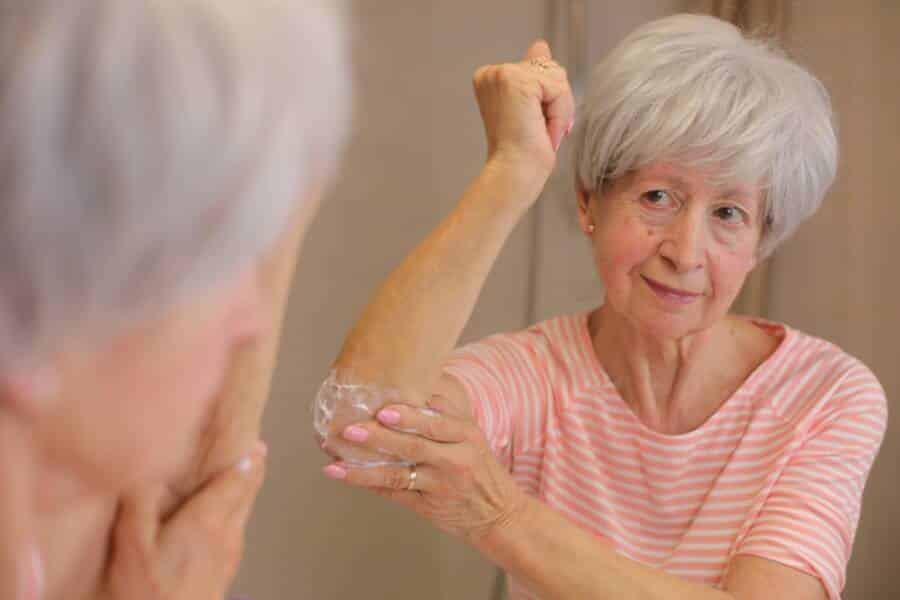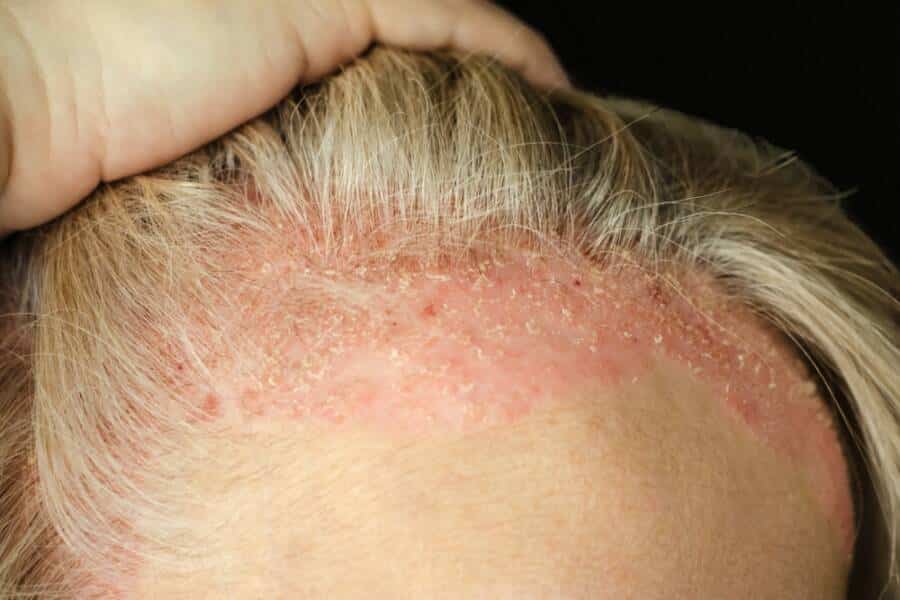Random Psoriasis Triggers Every Senior Should Know
Psoriasis is a chronic autoimmune condition that accelerates the growth cycle of skin cells, resulting in thick, scaly patches. Even though the exact cause of psoriasis is still unknown, various factors can trigger the condition, especially in seniors.
Living with psoriasis is challenging, no matter one’s age, but managing this health issue presents unique difficulties for seniors. As the body ages, the immune system undergoes many changes, and the skin becomes more susceptible to various triggers. Psoriasis is often associated with well-known triggers like stress, cold weather, and certain medications. However, during their golden years, seniors may encounter a host of unexpected factors that can exacerbate their condition. For seniors, who may already be dealing with multiple health issues, the added burden of managing psoriasis can feel overwhelming.
Imagine this: Mary, a 70-year-old retiree, wakes up one morning to find her skin more inflamed than usual. She hasn’t changed her skincare routine, her diet has remained consistent, and her stress levels seem manageable. After some investigation and visits to her doctor, she discovers that the new medication she started for arthritis might be causing her symptoms. Meanwhile, John, a 75-year-old retiree who loves gardening, notices his psoriasis flares up every spring and fall. He eventually links this to his seasonal allergies, something he had never considered before.

Psoriasis can be highly individual
As you can see, these scenarios highlight a crucial point – psoriasis triggers can be highly individual and most times surprising. For seniors, especially those who have lived with psoriasis for many years, it can be frustrating to identify and adapt to new triggers. Before getting to the most common triggers, it’s important to remember that managing psoriasis is a unique experience and what works for one individual may not work for another.
Understanding the triggers can help you manage the condition and maintain a high quality of life.
1. Cold weather
One of the most common yet unexpected triggers for psoriasis is weather change. Sudden shifts in temperature and humidity levels can cause the skin to react. Cold and dry weather can easily lead to dry skin, which can exacerbate psoriasis symptoms.
2. Infections
Bacterial or viral infections can trigger psoriasis in seniors. The immune system’s response to an infection can cause psoriasis to flare up. Some of the most common infections that may affect seniors include respiratory infections, urinary tract infections, and shingles. Keep in mind that correct treatment is essential to prevent psoriasis from getting worse.
3. Certain medications
Seniors often take multiple medications for various health conditions. Some drugs such as beta-blockers, and lithium can worsen psoriasis symptoms. In case you notice some changes, you should immediately contact your doctor and identify any potential triggers. If necessary, don’t hesitate to explore alternative treatments.
4. Smoking
Smoking is another significant and dangerous trigger for psoriasis. The harmful chemicals in cigarettes can cause serious inflammation and damage the skin. Seniors who smoke are most likely to develop psoriasis.
5. Alchohol consumption
Excessive alcohol consumption can dehydrate skin and weaken the immune system. Seniors should limit their alcohol intake and stay hydrated to maintain healthy skin and reduce the risk of flare-ups.

6. Diet and nutrition
Diet plays a huge role in our overall health. Certain foods can trigger inflammation and exacerbate psoriasis symptoms. For seniors, it’s very important to have a balanced diet and avoid foods that can trigger symptoms such as red meat, dairy, and processed foods. Instead, focusing on anti-inflammatory foods such as fruits, and vegetables. and omega-3 fatty acids can do magic.
7. Lack of exercise
Regular exercise is beneficial for overall health and can help reduce stress, which is known as being a serious trigger of psoriasis. Seniors should have regular physical activity to help manage their condition.
8. Obesity
Obesity is not good at all, no matter the health issues we are dealing with. All it does is worsen any symptoms. Excess body weight can lead to increased inflammation, which is a primary driver of psoriasis. The link between obesity and psoriasis is well-documented, with studies showing that higher body mass index (BMI) is associated with more severe psoriasis.
9. Sleep deprivation
Sleep is crucial for overall health, including skin health. Sleep deprivation can significantly weaken the immune system, increase stress levels, and lead to inflammation, all of which can trigger psoriasis. For seniors, sleep disturbances are very common due to a lot of factors such as medical conditions, medications, and changes in sleep patterns with age.
10. Allergies
Common allergies include pollen, dust mites, pet dander, and certain foods. Seniors need to identify and manage these allergens in order to keep psoriasis under control. Unfortunately, severe allergic reactions can significantly worsen psoriasis symptoms
11. Dental problems
Pool oral health and dental infections can trigger psoriasis flare-ups. So, seniors need to maintain good oral hygiene and visit the dentist regularly. Conditions such as gingivitis and periodontitis are particularly problematic.
12. Air pollution
As you already know, air pollution is a growing concern globally and has a direct impact on skin health. Pollutants can penetrate the skin and cause inflammation, leading to psoriasis flare-ups.
In order to minimize exposure to air pollution is recommended for seniors to stay indoors on days when pollution levels are high and use air purifiers in their homes.
13. Tattooing
Tattooing represents a huge risk for individuals with psoriasis. The tattoo needle produces trauma to the skin and can trigger the Koebner phenomenon, where new psoriasis lesions develop on the site of the skin injury. So, individuals with psoriasis are often advised to avoid tattoos at all costs.
14. Dehydration
Healthy skin needs to be hydrated correctly. Dehydrated skin can become dry, flaky, and more prone to psoriasis flare-ups. Seniors are usually more likely to deal with dehydration due to reduced thirst perception and potential medical conditions.

15. Perfumes
As you already know, a lot of perfumes and fragrances contain chemicals that can irritate the skin and trigger psoriasis. Alcohol, synthetic fragrances, and certain essential oils are some of the ingredients that can cause allergic reactions and inflammation.
In case you have sensitive skin, opt for fragrance-free or hypoallergenic products that can significantly help you reduce the risk of skin irritation.
16. Excessive sweating
Excessive sweating is not good at all for those suffering from psoriasis, since sweat can create a moist environment that encourages bacterial growth and inflammation. All seniors should wear breathable and moisture-wicking clothing, use antiperspirants, and most importantly, maintain good hygiene. Talcum powder can reduce moisture and irritation if applied to areas prone to sweating.
17. Lack of exercise
Exercise plays a vital role in regulating the body’s immune system. Regular physical activity helps modulate the immune response, potentially reducing the frequency and severity of psoriasis flare-ups. For seniors, incorporating even moderate exercise can help keep the immune system balanced and less likely to trigger these skin issues.
That’s not all! Lack of exercise is closely linked to obesity and metabolic syndrome, both of which are common triggers for psoriasis. Excess weight increases the production of inflammatory proteins and physical activity helps in managing weight and reducing these inflammatory markers. For seniors, some of the best activities are walking, swimming, or yoga, and can significantly contribute to a healthy body and lifestyle.
Are you interested in learning more about psoriasis? You should also read: 10 Foods to Avoid When You Have Psoriasis.














2 Responses